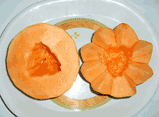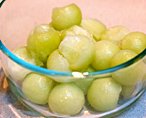Selection and storage
Cantaloupes best grow during the summer months. In the markets, try to buy organically produced muskmelons since they are richer in taste as well as nutrients.
Often, it could be difficult to judge the ripeness and flavor without checking out a wedge section of the melon. Look for one that weighs heavy for its size with a firm rind that is neither overly shiny nor lusterless, without any cuts or bruises on the surface, which might have occurred while transporting the fruit.
At home, place them in a cool, well-ventilated place. Cut sections, however, should be kept in the refrigerator.
Preparation and serving methods
Cantaloupe outer surface may harbor harmful salmonella bacteria, especially in areas of minor cracks and cuts. Therefore, wash
the whole fruit in cold running water thoroughly before consumption.
Depending on the size you desire, the fruit can be sliced, cubed , or scooped into balls.

|
 |
| Muskmelon sections! | Honeydew melon balls! Photo courtesy: sethbaur |
Here are some serving tips:
-
Eat fresh cantaloupe as it is without any additions to experience its delicious, natural taste.
-
The fruit sections are a great addition to fruit salad.
-
Jam, sorbet, and juice are some nutritious and delicious items you can prepare with muskmelon.
-
Add cantaloupe sections in the desserts, with ice cream, or custard.
Safety profile
Allergic reactions to muskmelons have not been reported so far, and they can be consumed safely in pregnancy and in nursing mothers. However, being a member of Cucurbita, some fruits may carry cucurbitacin toxin. For the same reason, it is recommended to avoid unripe/bitter-tasting melons. (Medical disclaimer).
≻≻-Also read: Galia melon nutrition facts and health benefits.
≻≻-Back to Fruits from Cantaloupe nutrition facts. Visit here for an impressive list of all kinds of fruits with
complete illustrations of their nutrition facts and health benefits.
≻≻-Back to Home page.
Further Reading and Resources:
-
Stanford School of Medicine Cancer information Page- Nutrition to Reduce Cancer Risk.
-
Specialty melons-University of Kentucky -PDF.

